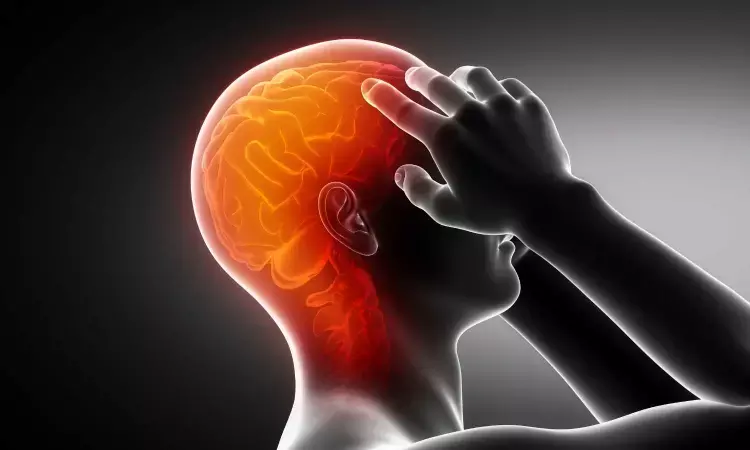- Home
- Medical news & Guidelines
- Anesthesiology
- Cardiology and CTVS
- Critical Care
- Dentistry
- Dermatology
- Diabetes and Endocrinology
- ENT
- Gastroenterology
- Medicine
- Nephrology
- Neurology
- Obstretics-Gynaecology
- Oncology
- Ophthalmology
- Orthopaedics
- Pediatrics-Neonatology
- Psychiatry
- Pulmonology
- Radiology
- Surgery
- Urology
- Laboratory Medicine
- Diet
- Nursing
- Paramedical
- Physiotherapy
- Health news
- Fact Check
- Bone Health Fact Check
- Brain Health Fact Check
- Cancer Related Fact Check
- Child Care Fact Check
- Dental and oral health fact check
- Diabetes and metabolic health fact check
- Diet and Nutrition Fact Check
- Eye and ENT Care Fact Check
- Fitness fact check
- Gut health fact check
- Heart health fact check
- Kidney health fact check
- Medical education fact check
- Men's health fact check
- Respiratory fact check
- Skin and hair care fact check
- Vaccine and Immunization fact check
- Women's health fact check
- AYUSH
- State News
- Andaman and Nicobar Islands
- Andhra Pradesh
- Arunachal Pradesh
- Assam
- Bihar
- Chandigarh
- Chattisgarh
- Dadra and Nagar Haveli
- Daman and Diu
- Delhi
- Goa
- Gujarat
- Haryana
- Himachal Pradesh
- Jammu & Kashmir
- Jharkhand
- Karnataka
- Kerala
- Ladakh
- Lakshadweep
- Madhya Pradesh
- Maharashtra
- Manipur
- Meghalaya
- Mizoram
- Nagaland
- Odisha
- Puducherry
- Punjab
- Rajasthan
- Sikkim
- Tamil Nadu
- Telangana
- Tripura
- Uttar Pradesh
- Uttrakhand
- West Bengal
- Medical Education
- Industry
Certain migraine medications more effective than ibuprofen for treating migraine attacks: Study

USA: A recent study published in Neurology revealed that certain migraine medications like ergots, triptans, and anti-emetics may be two to five times more effective than ibuprofen for treating migraine attacks.
For many people with migraine, it can be difficult to find a treatment that is effective and reliable, and there is a lack of information on how medications compare to one another. The new study drew data from nearly 300,000 people using a smartphone app to help people make decisions about their medications.
Migraine attacks are characterized by intense throbbing head pain, sensitivity to light and sound, nausea or vomiting. Previous research has shown migraine can also be associated with cognitive issues. All of these symptoms may impact a person’s quality of life and productivity.
“There are many treatment options available to those with migraine. However, there is a lack of head-to-head comparisons of the effectiveness of these treatment options,” said study author Chia-Chun Chiang, MD, of the Mayo Clinic in Rochester, Minnesota, and member of the American Academy of Neurology. “These results confirm that triptans should be considered earlier for treating migraine, rather than reserving their use for severe attacks.”
For the study, researchers included over 3 million migraine attacks from nearly 300,000 users that were self-reported by people using a smartphone app during six years. The app allows users to monitor the frequency of migraine attacks, triggers, symptoms and medication effectiveness.
For those migraine attacks, participants entered 4.7 million treatment attempts with various medications into the app. They recorded in the app whether a medication was helpful or not. Researchers then used that information to calculate the effectiveness of each drug compared to ibuprofen.
Researchers looked at a total of 25 medications among seven drug classes. Different dosages of medication and formulas of each medication were combined in this analysis.
The study found that the top three classes of medications more effective than ibuprofen were triptans, ergots and anti-emetics. Triptans were five times more effective than ibuprofen, ergots were three times more effective and anti-emetics were two and a half times more effective.
When looking at individual medications, the top three were eletriptan which was six times more effective than ibuprofen, zolmitriptan which was five and a half times more effective and sumatriptan which was five times more effective.
Researchers found that when using eletriptan, participants found it helpful 78% of the time. Zolmitriptan was helpful 74% of the time and sumatriptan was helpful 72% of the time. Ibuprofen was helpful 42% of the time.
Researchers also looked at other groups of medication such as acetaminophen and nonsteroidal anti-inflammatory drugs (NSAIDs). NSAIDs other than ibuprofen were 94% more effective than ibuprofen.
Participants found ketorolac helpful 62% of the time, indomethacin was helpful 57% of the time, and diclofenac was helpful 56% of the time. However, acetaminophen was helpful 37% of the time and was found to be 17% less effective than ibuprofen when used for treating migraines.
Additionally, a common combination of medications used to treat migraine, aspirin, acetaminophen and caffeine was also evaluated and found to be 69% more effective than ibuprofen.
“For people whose acute migraine medication is not working for them, we hope that this study shows that there are many alternatives that work for migraine, and we encourage people to talk with their doctors about how to treat this painful and debilitating condition,” said Chiang.
Dr Kamal Kant Kohli-MBBS, DTCD- a chest specialist with more than 30 years of practice and a flair for writing clinical articles, Dr Kamal Kant Kohli joined Medical Dialogues as a Chief Editor of Medical News. Besides writing articles, as an editor, he proofreads and verifies all the medical content published on Medical Dialogues including those coming from journals, studies,medical conferences,guidelines etc. Email: drkohli@medicaldialogues.in. Contact no. 011-43720751


